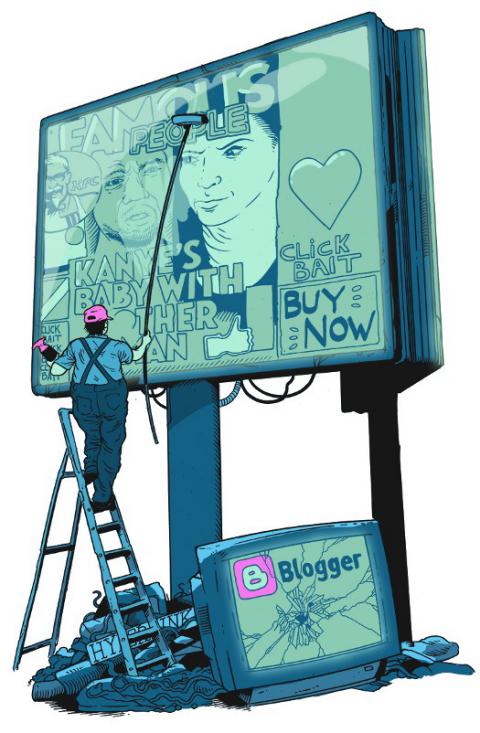- MSNBC Turmoil: High-Profile Anchors Oppose Network’s Hard News Pivot – Jordan Chariton (The Wrap)
- The Power of Black Twitter – Steve Williams (The Daily Beast)
- The Web We Have to Save – Hossein Derakhshan (Matter)
- You Don’t Know It, But You’re Working for Facebook. For free. – Caitlin Dewey (Washington Post)
- The Dark Web as You Know It Is a Myth – Joseph Cox (Wired)
- NPR to Pentagon: War Manual Encroaches on ‘Basic Press Freedoms’ – Tyler Falk (Current)
MSNBC Turmoil: High-Profile Anchors Oppose Network’s Hard News Pivot (Exclusive)
By Jordan Chariton
August 28, 2015
The Wrap
Joe Scarborough might be over the moon for MSNBC’s new hard news direction, but some of his on-air colleagues aren’t sharing his cup of “Morning Joe.”
Network insiders told TheWrap at least three of the network’s anchors — two of them higher-profile — are not on board with network chairman Andrew Lack and president Phil Griffin’s daytime overhaul from progressive firebrand to traditional news format.
“Hard news is a mistake,” one insider told TheWrap of direct conversations with one anchor.
Another anchor has said in public that Lack and Griffin have a fundamental misunderstanding of MSNBC’s audience.
The Power of Black Twitter
By Steve Williams
July 6, 2015
The Daily Beast
On the night of June 28, Twitter erupted. The occasion was the 2015 BET Awards, which attracted 12 million TV viewers—less than half of the 25.3 million who tuned in to this year’s Grammys. Yet, at any given moment, eight of the top ten trending hashtags in the United States that evening were related to the BETs, and since Twitter boasts an estimated 65 million users in the U.S., it’s safe to say Black Twitter is a force to be reckoned with.
The murders of Trayvon Martin and Mike Brown, the reality of street harassment, the racial crisis brewing in the Dominican Republic—these are all stories that became of major importance because Black Twitter made sure the world understood what was happening. And with popular hashtags like #YouOKSis and #BringBackOurGirls becoming recognized all over the world, it’s impossible to ignore how Black Twitter has been able to affect change and raise awareness.
The Web We Have to Save
By Hossein DerakhshanJul
July 14, 2015
Matter
Nearly every social network now treats a link as just the same as it treats any other object — the same as a photo, or a piece of text — instead of seeing it as a way to make that text richer. You’re encouraged to post one single hyperlink and expose it to a quasi-democratic process of liking and plussing and hearting: Adding several links to a piece of text is usually not allowed. Hyperlinks are objectivized, isolated, stripped of their powers.
But hyperlinks aren’t just the skeleton of the web: They are its eyes, a path to its soul. And a blind webpage, one without hyperlinks, can’t look or gaze at another webpage — and this has serious consequences for the dynamics of power on the web.
You Don’t Know It, But You’re Working for Facebook. For Free.
By Caitlin Dewey
July 22, 2015
Washington Post
Every major Internet institution, from Twitter, Facebook and YouTube to Wikipedia. Even when these sites don’t openly rely on “consumers” to create the content that keeps venture capital, ad revenue or donations pouring in, they’re mining them for other sorts of resources that can be monetized: personal data, structured and aggregate data, clicks.
“Digital labor is like a meeting with free pizza and soda,” quips the new media scholar Trebor Scholz, “but the Stasi is listening in.”
The Dark Web as You Know It Is a Myth
By Joseph Cox
June 18, 2015
Wired
There is a technological space called the dark web, where the servers of websites are hidden behind a veil of cryptography, and users also enjoy strong anonymity protections. But that space is nothing like the fairy tale that has been concocted around it; that of a colossal ocean of digital stores selling exclusive products, where criminals are free from prosecution. That characterization is not true.
Instead, the dark web is a small collection of sites that reflect the limited number of good, bad, and downright weird humans that use it.
NPR to Pentagon: War Manual Encroaches on ‘Basic Press Freedoms’
By Tyler Falk
August 21, 2015
Current
NPR has called on the Department of Defense to revise its “Law of War Manual,” released in June, which says that journalists’ reporting on military operations can be “very similar to collecting intelligence or even spying.”
In a letter sent to Defense Secretary Ashton Carter Aug. 19, Michael Oreskes, NPR’s s.v.p of news, said the document “creates dangerous ambiguity around the collection of information for use in reporting.” He adds that some of the statements made in the manual about journalists “are very broad and encroach on what we consider to be basic press freedoms.”


Spread the word